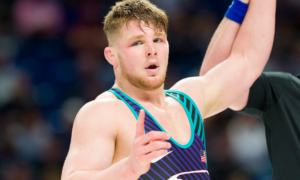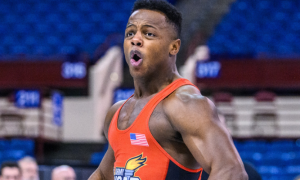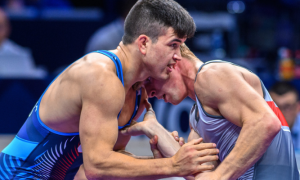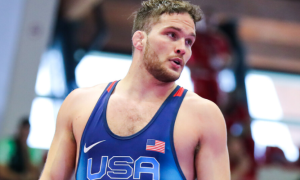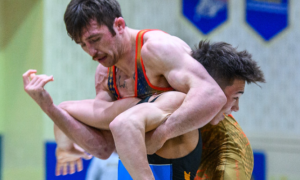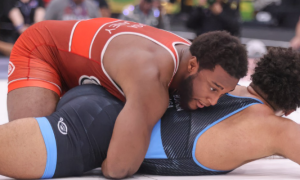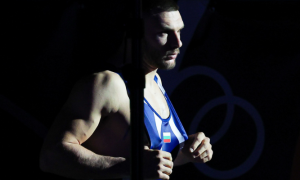Since November, 2021 World Team member Alan Vera (87 kg, NYAC, 5PM #2) has been in Kiev, Ukraine. And he is not hurrying back to the States.
Vera, who turned 31 at the end of October, resides in Jersey City, New Jersey with the brunt of his workouts taking place at the NYC Regional Training Center housed at the Edge in Hoboken. Although the facility and its coaches have on occasion tried to accommodate Vera’s needs, Greco partners are less than sparse in the region. Unless attending Senior-level camps, the ’20 US National Champion is thus compelled to seek out opportunities elsewhere, whenever possible, as he continues his quest for a World title.
What that has mainly entailed is well-documented. Vera was one of several high-profile athletes who last year participated in the litany of “officially-unofficial” National camps that were held around the country. Prior to the pandemic, it was the same story. Vera — who defected in ’16 but only became eligible to represent this nation a season ago — would regularly travel in search of reliable training partners. He is accustomed to the lifestyle, just like so many of his contemporaries.
But this time? This current extended stay in Ukraine?
It’s a little different.
First, the Knee
Vera was widely seen as the top contender to Joe Rau in the 87-kilogram bracket at the ’20 Olympic Trials, at least until John Stefanowicz (Navy-Marines RTC, 5PM #1) staged a memorable comeback late in the second period of the mini tournament’s semifinal round to eliminate that narrative. Vera eventually rebounded five months later by winning the Lincoln Trials, resulting in his first-ever chance to compete for a World medal. The event in Oslo surprisingly wound up a one-and-done affair. Vera’s lone match was a loss to Turpal Bisultanov (DEN), which was followed by a buckling-down of his resolve — and a desire to gain full health.
He wasn’t 100% for the Worlds. Vera wasn’t even 100% for the Olympic Trials back in April. There is only a brief pause in the conversation, because this is the part when it gets dicey. Athletes are usually hesitant to discuss an injury that had occurred before a competition, lest they risk being labeled as an excuse-maker. Vera is no exception. Just the suggestion of chewing it out a little elicits a sigh, though his politeness prevents a blockade.
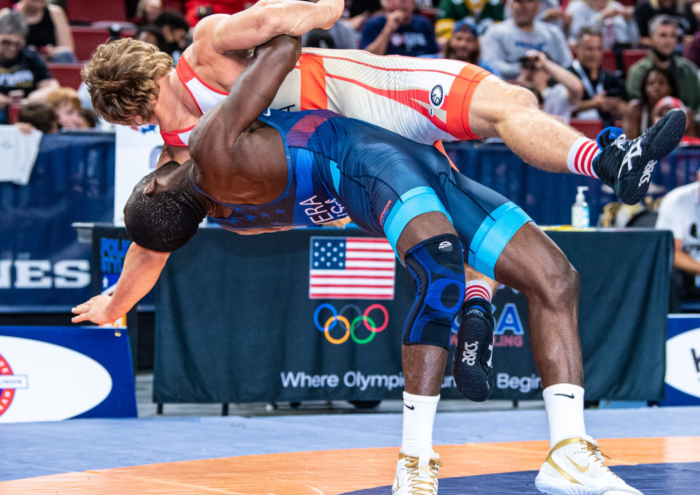
Vera (blue) throws Ryan Epps during their finals series at the 2021 World Team Trials in Lincoln, Nebraska. (Photo: Sam Janicki)
Vera’s right knee first became a legitimate hindrance last winter. Both the meniscus and ACL were torn, the latter worse than the former. “He, the doctor, couldn’t believe that I was able to even walk,” admits Vera. Time was not then available to properly address either, so he plugged along with his eyes set on a ride to Tokyo. A ride that, of course, was cut short by Stefanowicz’s effort.
But Vera shudders at the thought of using his knee injury as a reason for the loss. Of his match with Stefanowicz, he simply says, “That was on me”, and then allows his words to settle into the ether. He had opted not to try his luck in the consolation bracket despite its National Team implications. Dejection accounted for a small percentage in the decision. More than anything else, he needed to rest and regroup.
Surgery was not an enticing proposition, however. He had already known that much. “The doctor told me one year,” explains Vera. “That was too long because I still wanted to wrestle in Oslo.” A time-table that long would have not only excluded Vera from the ’21 Trials, but also put his ’22 campaign in jeopardy. In his mind, there wasn’t even a choice — other than to fix the tear that promised the shorter recovery time. Vera underwent an orthoscopic procedure to repair his damaged meniscus during the summer. The knee is still not all the way correct, and the ACL is still detached. But — he feels formidable again, much more so than in Oslo or any other time since the knee decided to betray him. “No, I can wrestle fine,” Vera insists. “I love soccer, but I can’t play soccer because of the instability. Basketball, I like basketball and I can’t play. But it feels good now. I can wrestle, man.”
Now, the Trip
And he certainly can wrestle. Vera is, virtually without argument, the best upper-weight technician in the United States program. His very selection onto the World Team brought with it realistic hopes for a medal in Oslo due primarily to one key factor: par terre, both offense and defense. Vera owns a pristine side lift; he is also suitably adept at defending from bottom. The two main ingredients in Greco-Roman’s recipe for success are featured in his skill-set, which is why knowledgeable US fans were excited about his prospects in the tournament.
That is why he jetted off to the UKR a few weeks ago.
Oslo gnaws at Vera in a deeper way compared to the Olympic Trials. The knee was okay in October; not great, not normal, but workable. His training for the tournament wasn’t superb. Only when Team USA came to town for camp did he start to reclaim a more contextualized understanding of his progress. The thorn in Vera’s side is subject to the “good enough” paradigm. Was he able to train for Oslo? Yes. Was he able to compete to his maximum potential? No — but the whole package combined, to him, was good enough. And if Vera was good enough to wrestle, then he felt good enough to win, string-cut ACL or not.
The roots of his consternation surrounding the circumstances failed to allow for prolonged contemplation. When Oslo was over, he didn’t need to overthink the thing. He did not have to go somewhere and mediate on what was required. Instead, the solution to his problem was pragmatic.
Vera could not be “Vera” at the Worlds because confidence lacked in his repaired knee. Also lacking are, and have been, accessible high-speed training partners.
Vera believes he is a World medalist-in waiting.
To make that happen, hanging out in the greater NYC metro area, while the bitterness of defeat still mercilessly stings, was not the smoothest move.
Going to Ukraine — home of the reigning Olympic gold medalist in his weight class — absolutely was.
For the past few weeks, Vera has been training with a group of top Ukrainian athletes, including Zhan Belenyuk (87 kg, world #1). The best part is that there is a long leash on the experience. Vera is not due back stateside until early February. That gives him plenty of time to receive looks against a variety of seasoned competitors, with Belenyuk naturally serving as the main attraction. “I just came here to wrestle with these guys, and I also have a few 97’s (kilograms) but Belenyuk wanted to wrestle with me, too. How could I say ‘no’ to a guy like him? He has been really great and we’ve been training together a lot.”
In addition to what could be defined as “wrestling-related activities”, Vera is sticking to the rehabilitation process, as well. He is doing strengthening exercises and remaining mindful of clearing whatever mental hurdles that are perceived. “It’s really just psychological a little bit as far as doing my side lift or a straight lift, but it is going fine,” he says.
The only hitch to this second Ukrainian trip for Vera (he placed third at the Ukrainian International in ’19) is that he does not have the company of his wife, ’12 World Champion/multi-time Word medalist Elena Pirozhkova. Pirozhkova is the head coach for New Jersey City University’s freestyle team and their season is well underway, which ended talk of her joining him overseas before it was ever broached. She has numerous coaching responsibilities with which to deal, for starters. Perhaps more importantly, Priozhkova was fully on-board with the plan immediately. “She understands the game, she was a World champ,” informs Vera, as if anticipating the topic. “She was a great wrestler and said that I need to do this. I can’t just be a champ at home, there are sacrifices we make to do this sport. She has been supporting me from Day 1, and there is no way I can do this without her.”
Everything appears in order. Each year, US athletes who travel abroad during the season have their own reasons for doing so. Sometimes, the objective is isolated, such as a single tournament or training camp. Others, it might be more ambiguous, particularly during the autumn when the competitive season is simmering and not yet boiling. Foreign partners, different coaches, chances to shore up a piece in one’s arsenal… A conglomeration of motives dotting a list that they all have in their heads.
For Vera, it is not a list. He may have been prodded or steered in this direction, but is entirely zeroed in on the purpose. Oslo bothered him. It does ever more. Serbia ’22 is next, and the opportunity to do something about it now is within his grasp. His knee is coming along. He is growing increasingly emboldened by the day, and really all he needs is to know that the work he puts in is productive. It also doesn’t hurt that the #1 guy in his weight category keeps trying to reverse lift him on a daily basis.
In October, Vera might have thought he was “good enough” to wrestle. Now it is about becoming, and feeling, good enough to achieve what he unequivocally believes he can. So encouraged is Vera that a declaration hath thus been made, one that he requested be presented publicly. “I’m going to win a medal next time. You can put that, you can write that down.”
Done.

Listen to “5PM50: Mr. Fantastic Benji Peak” on Spreaker.
Listen to “5PM49: Robby Smith on coaching, fatherhood and mentors” on Spreaker.
Listen to “5PM48: Austin Morrow and Gary Mayabb” on Spreaker.
SUBSCRIBE TO THE FIVE POINT MOVE PODCAST
iTunes | Stitcher | Spreaker | Google Play Music

Notice: Trying to get property 'term_id' of non-object in /home/fivepointwp/webapps/fivepointwp/wp-content/themes/flex-mag/functions.php on line 999




